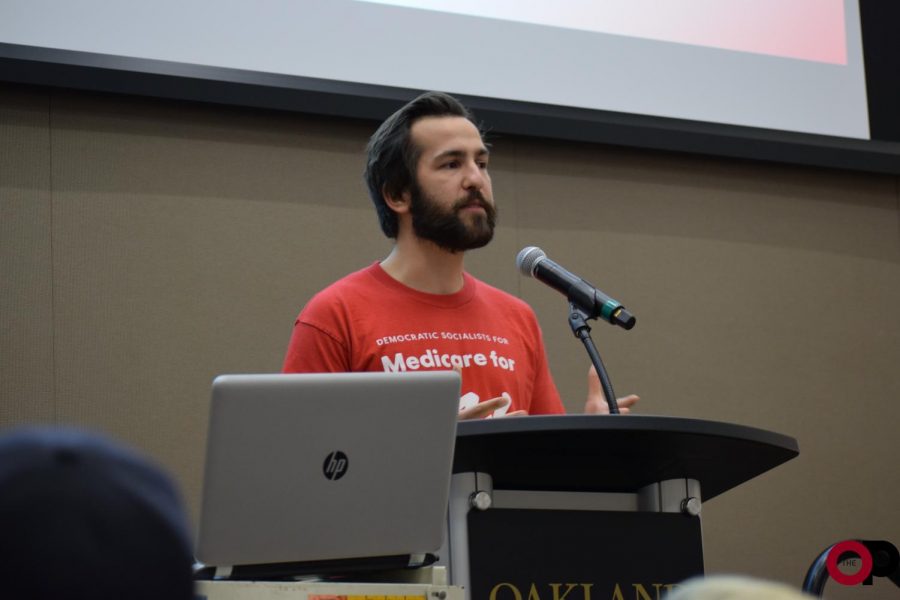Making sense of Medicare for All
The Young Democratic Socialists of America of Oakland University (YDSA) hosts a town hall event to support Medicare for All on Wednesday, Nov. 6.
“Medicare for All” is one of the most divisive topics on the 2020 campaign trail. Between partisan fighting and the rising ocean of misinformation, it can be hard to figure out just what Medicare for All actually means.
The Young Democratic Socialists of America of Oakland University (YDSA) are here to clear up confusion. On Nov. 6, the YDSA hosted a Medicare for All town hall event where activists Kyle Minton and Majorie Mitchell, family practitioner and Bernie Sanders 2020 national surrogate Dr. Victoria Dooley, and 2018 Michigan gubernatorial candidate and host of the podcast “America Dissected” Dr. Abdul El-Sayed explained and expressed support for Medicare for All.
Minton, an activist with the Democratic Socialists of America Medicare for All working group, laid out the five points that make a healthcare policy specifically Medicare for All. According to Minton, the policy has to be single-payer — meaning the only payer is the U.S. government, not a myriad of insurance companies — and all forms of medical care must be covered — including vision, dental, mental healthcare, prescription drugs and long-term care. He also said healthcare must be free at the point of service with no copays or deductibles and that everybody in the U.S. must be covered. A “just transition” from the current system to a Medicare for All system is also a must.
“People who are currently working in the private insurance industry might not be able to transition over to work for Medicare,” Minton said, explaining the just transition process. “So we want those people to have jobs training, a just retirement package and, in many cases, salary replacement as well.”
Regarding the cost of Medicare for All, Minton cited a working paper study by the libertarian think-tank Mercatus Center that stated a Sanders-backed Medicare for All plan would see the U.S. government spend about $32 trillion over 10 years, roughly $2 trillion less than the current healthcare market spends. Minton also cited claims by economists Gabriel Zuckman and Emanuel Sayez that employee incomes would increase under Medicare for All due to it being funded by a progressive, income-based taxation.
El-Sayed illustrated the lack of choices under the current healthcare system by explaining how much of healthcare is emergency-based. To do this, El-Sayed went through the process of having a heart attack — taken by EMTs to the nearest hospital, assigned a doctor, examined and had a procedure done. He explained how the person in that situation either cannot physically make a choice or has no time to make a choice.
“So much of the conversation about health care right now is about whether … you have a choice,” El-Sayed said. “So much of health care is done … in an emergency, and so there are not really choices in most of the health care that is the most important.”
Dooley spent time discussing the implications that Medicare for All would have for the poor, minority groups and people with preexisting conditions, saying Medicare for All would be “healthcare freedom for all” by ending health disparities.
“[Health disparity] is when people of color, black people, brown people and poor people have worse health outcomes simply by the color of their skin or by their economic status,” Dooley said.
Since everybody would be covered under Medicare for All, people who currently face health disparity due to insurer means-testing will not be denied coverage.
“[Medicare for All] is not free stuff,” Dooley said. “It is called getting something from your tax dollars.”












Michele VanFleteren • Nov 18, 2019 at 10:24 AM
Great article! Encouraging to see to see community members, alum, and current students working together for heath justice.